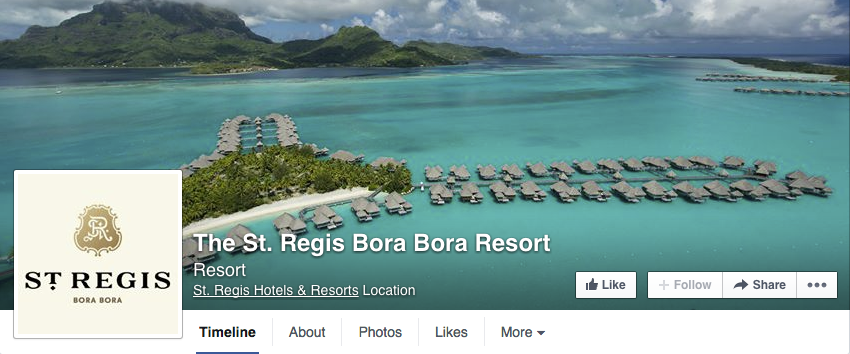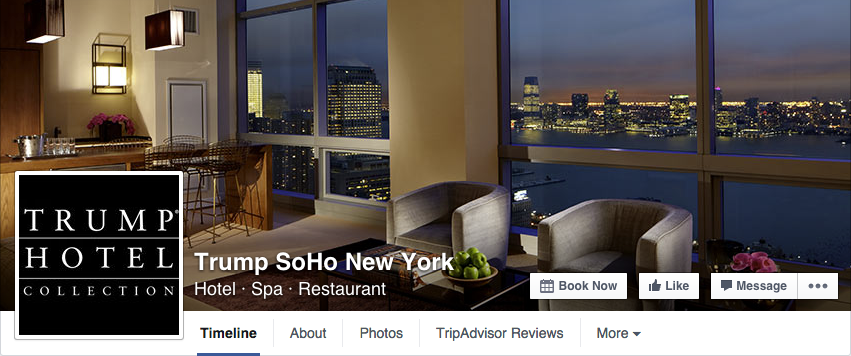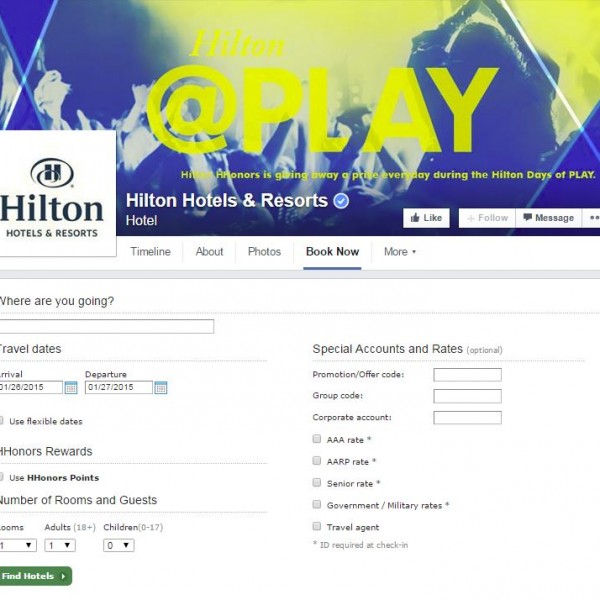Facebook Marketing for Hotels: 5 Essential Tips For Success
by Meisha Bochicchio
Gone are the days where you have to explain to Grandma what this whole “Book Face Thing” is.
It’s 2015 and Facebook, in its over ten-year lifespan, has managed to become the most widely recognized and utilized social media platform in existence. Though there has been much speculation in recent years over the alleged demographic shift, there’s still no debating the obvious opportunity that this social channel presents.
From a hotel perspective, if you are not on Facebook, you’re doing it wrong. “It” being marketing.
Whether you are a small mom-and-pop operation or a multi-billion dollar corporation with locations around the globe, Facebook is a gateway for you to connect with past, present, and future guests. Though the thought of managing a full-fledged hotel social media campaign might sound overwhelming, it really doesn’t have to be. And, though there are plenty of opportunities to think outside of the box and try different avenues (ex: paid ads), there are also several very simple best practices that will help your hotel shine on social media.
Enjoy our rundown of Facebook marketing best practices for hotels.
1. Consistent Profile Information
The very first thing that you need to do when setting up a Facebook profile for a hotel is to be sure that any and all information listed on that page is consistent across all channels. This means making sure the hotel address, phone number, email address, etc. are all up to date and the same as listed on your website, Google, and other online profiles. This is crucial. Not only is it important to give your guests consistent information but it is also essential from a search engine perspective as search engines can recognize conflicting information and might not understand which information is correct. You will also be able to include a direct link to your property and include hyperlinks to different areas of your website within the website description box; be sure to take advantage of this space and link directly to your website where it makes sense.
2. Excellent Photography
Your profile will feature a main thumbnail-sized profile photo as well as a larger banner-sized cover photo. Quality is key here. Photos are the main selling point for hotels and this needs to be reflected anytime you post a photo to any website or account, but especially a personal business page. Photos to consider for these profile pictures include shots of your property, amenities, or a killer view that the property offers. Below are several examples of great profile photos:
St. Regis Bora Bora does a phenomenal of putting the uniqueness of their resort front and center with this cover photo:

Do you have immaculate interiors or a stunning view? If so, consider showcasing this in your cover photo like the Trump SoHo Hotel:

If your property offers a unique amenity, like the W XYZ Lounge found at Aloft Hotels, show it off and bring guests in:

The Vendue does a fantastic job of differentiating themselves with art and communicates this effectively with their cover photo of choice:

Does your hotel promote seasonal specials? Get the message out loud and clear like Atlantis did by including this in your cover photo:

3. Content
Now that the Facebook profile is all set up it’s time to start communicating with your audience! It is important to convey the tone of the property that you are representing and to communicate in a language that your audience will understand. This might seem like a no-brainer, but a hotel that caters to the busy business traveler will communicate much different information than a property that serves a young adult demographic.
The general 80/20 rule also applies to Facebook – 80% content geared towards your audience about your audience, 20% self promotional.
Avoid too much “book now” material and focus on content that people actually want to see:
- High-quality hotel photos – either photos that a hotel staff took or pictures from hotel guests
- Questions – find out what your guests’ interests are (these are particularly good for encouraging post engagement)
- Blogs
- News articles
- Hotel or general travel tips
- Positive reviews from past guests
- Giveaways
- Current deals, specials, or promotions
- Links to virtual property tours
- Information on area attractions, dining, events, etc.
- Unique hotel points – Is your hotel pet-friendly? Or is your hotel oceanfront? Find these niches and capitalize on them in unique ways
As far as the daunting “when is the best time to post” question, the answer truly is that it varies for each hotel. Every audience is different and guests are often switching devices throughout the day. The best way to find out when the “best” time of day to post is will be to test different times and find out for yourself. One will, however, want to try and post several times a day, if possible. Organic (unpaid) reach is slowly dwindling and posting multiple times per day will help your messages get to a larger audience. Plus, the more you post, the more quickly you will learn what content works for what time of the day or week and will help you optimize the social strategy.
4. Engagement and Interaction
Monitoring a Facebook page, encouraging engagement, and providing responses to page interaction in a timely manner is arguably the most time-consuming aspect of running and maintaining a Facebook presence. This is why some hotels prefer to work with an agency for social media management. It is our humble opinion, however, that social media management is much more effective when managed in-house; only those who are on the property will know the ins and outs of the hotel and can provide real-time, authentic marketing. Things to keep in mind when managing a hotel Facebook page include:
- Be sincere – Personally interact with people on your page whenever possible and use the “@” symbol to tag them in the response.
- Be timely –You will most likely not have to respond immediately to every single interaction, which is perfectly understandable; but, responding within a one to two-hour time window is a good rule of thumb. People might assume that you don’t care about what they have to say if you respond a day or two later, though that might not be the case at all.
- Be humble – Unfortunately, not every single experience that a guest has with your hotel is going to be positive. If you do receive negative feedback, DO NOT – I repeat – DO NOT ignore or delete the post. Be understanding and apologetic in your response and attempt to correct the situation as soon as possible.
As your fan base grows the time it takes to manage and upkeep the communication channel will also grow. This could easily be a full-time job! However, if hiring a full-time social media manager is not within the budget, consider adding a few people to the team to help manage the workload. The marketing manager, general manager, or even ahead concierge are good places to start. If you are including multiple people into the social media management team just be sure to have standards and processes in place to maintain brand consistency.
5. Custom Tabs
If you happened to have an in-house webmaster or web developer you might want to consider adding custom tabs to your Facebook profile. Implementing this will require a bit more work in the beginning but could allow unique features not normally offered via Facebook like a “book now” tab as seen below:

There you have it – all of the basics to setting up and maintaining a kickass Facebook presence for your hotel!
Now that you’ve got the basics down, be sure to read our next segment on Facebook Ads for hotels which present a great opportunity to reach untapped and potentially unexplored markets and to expand your reach even further.
Do you have a question? Feel free to send us an email – we don’t bite.